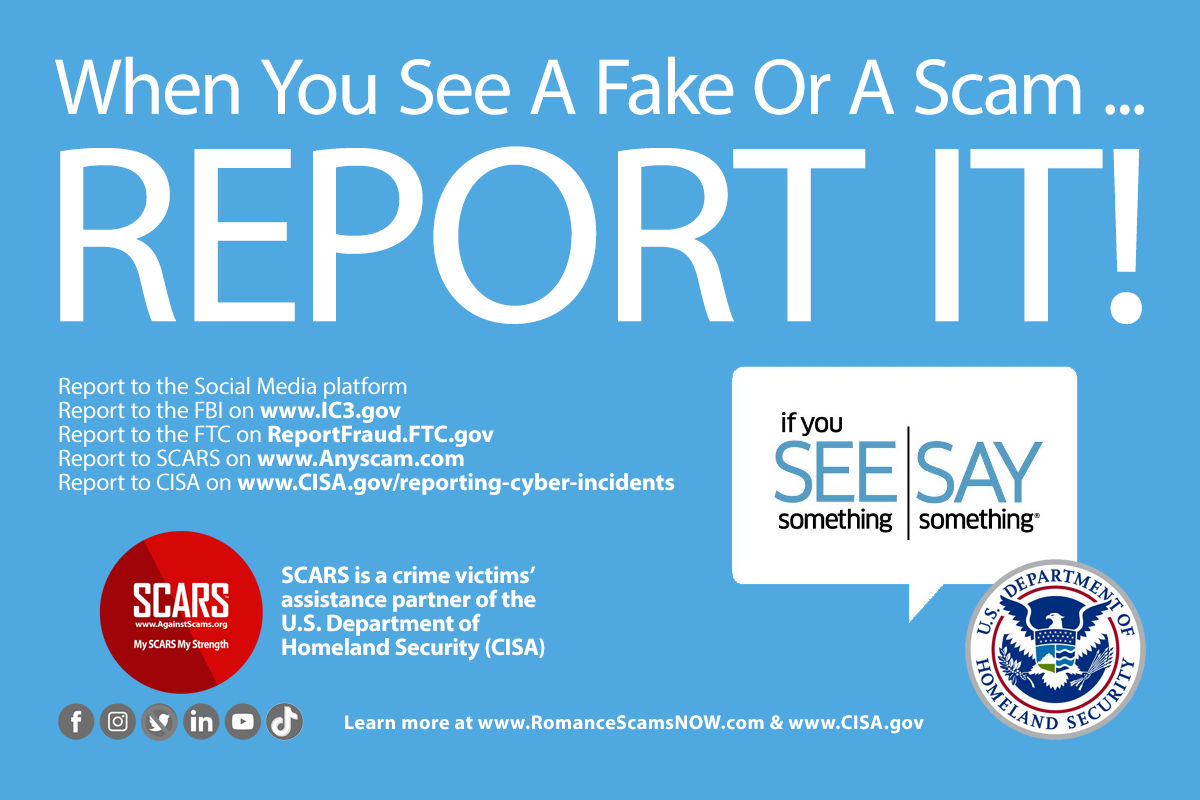Reporting Scams – Why It Really Matters!
Did You Know That Most People Do Not Care About Reporting Scams?
Sadly, we know that 95% of you who will read this will not be reporting scams or report your scammer to law enforcement or any credible entity
That is Truly Tragic!
As citizens, each of us has a duty to report crimes. Yet when it comes to scammers most victims remain silent.
There are so many excuses for why they are not reporting scams:
- The police are mean, they are judgmental, they are unkind
- The police do nothing about it anyway
- I am embarrassed – I am ashamed
- Why bother, scammers, will just keep scamming
All of which may be true, depending on the professionalism of the police agency. But it does not matter – a few minutes of discomfort can have a huge impact on yourself and the world.
Yet, a huge number of people decide to expose their scammer on social media. That kind of reporting scams has no real effect.
Why Is It Important To Report Scammers To Your Local And National Police?
Of course, the first reason is that it is your duty! But in an age of instant gratification, who cares about their responsibilities to anyone else?
However, there are many real reasons why you should do it!
By Reporting Scams You Are Declaring Yourself An Innocent Victim!
Beginning in 2022, law enforcement started looking at victims that do not report differently. While not reporting scams is not a crime, many victims actually did commit crimes by sending money to their scammers – these include bank fraud, wire fraud, and more. If the victim receives money or gave access to their financial accounts it is even worse.
There are no secrets in scams. Eventually, the police will come knocking on the door if you were a money mule or you attempted to hide the scam and protect the criminals. Reporting scams then becomes a necessity for every victim to protect themselves from any potential for future prosecution.
Reporting Scams To Law Enforcement Is Critically Important
Beyond keeping the local peace and preventing crime, all law enforcement has a legal responsibility to report crimes up through government, so local, state (provincial), and national governments understand the reality of crime. This reporting determines resources such as money and manpower. It determines training requirements and victims’ support needs. It also helps the government at the national level to understand what new laws and international cooperation may be needed to control this.
When you do not report, you deny this information up and down through your government, keeping them in the dark. Governments work off of hard statistical data in making their decisions. If it is not in the data, it did not happen. They have to be objective, and only hard data reported is objective.
Failing to report crimes also means the police do not know what local victims’ assistance resources they need to better train their officers and support victims in crisis. With more than a million victims a year just in the United States – governments around the world only saw about 1-3% of those victims reporting scams (and since victims are typically scammed more than once, the number of reported crimes was about 1-3% of those that actually occurred).
Now you know why police do not respond more seriously to the small number of reports they do receive. Because they do not see it as that big of a problem – because victims are not reporting scams.
At The National Level – Reporting Scams Matters!
Since most online fraud is transnational – meaning the victims and scammers are not in the same country – extradition treaties are required to arrest scammers. Very few countries will extradite fraudsters currently. These treaties envisioned traditional criminals, such as murderers and bank robbers. But scams are unique since the victims willingly send the money to the scammer under fraudulent pretexts, but this makes a huge difference when trying to extradite a criminal in most of the African countries especially.
This means that new treaties are needed that specifically address these types of crimes, and this means that national politicians need to fully understand the magnitude of these crimes. By not reporting them, you deny them the information they need to make decisions about the need for new extradition treaties.
Additionally, Reporting Scams To Your Local Might Recover Your Money!
Local law enforcement is now more effective than ever at recovering victims’ money, especially cryptocurrency. But if you never report the crime to your local police you will never have a chance of getting your money back.
Do You See How One Simple Failure Can Cascade Up The Line?
This is a simple argument, do the right thing, and the rest sorts itself out. Failing to do the right thing, and the whole system fails.
People do not believe romance and other online scams are a big deal because victims have failed to report them. A few moments of discomfort can make all the difference to your community and your country.
As parents tend to tell children, there are no shortcuts to a reward. You have to do the work. Do the hard thing to get the benefit.
Without your report, police are left in the dark and it goes on from there.
But The Police Do Not Do Anything Anyway …
This is a statement we hear hundreds of times a day. Victims are fed a steady stream of false information and urban legends from other victims about what the police do or do not do. Plus the police themselves contribute to this when they tell victims there is nothing they can do to catch the scammer or get their money back.
That Is True, But Not The Whole Story
When the police take a report, of course, it serves to collect data needed as we have said, but it also does something else. It collects data that can be used to help police understand the use of Money Mules. Often Money Mules are within your country – that means that even though the scammer may be in Africa, the Mule is helping the scammer from within your country. These Mules contribute to as many as 20% of all scams, and shutting them down has a big impact.
By reporting scams to the police, they may not say they will do anything because they do not want you to get your hope up, but the wheels will keep spinning behind the scenes. Whenever they can find a nexus in your country, responsible police will explore it. This can lead to the shutdown of a Mule, and in many cases the recovery of some funds. If nothing else, many Mules are victims living in denial, and this gets them help and forces them to recognize that they were being scammed too.
WE ASK YOU TO BE AN ADVOCATE
We ask you to be someone that makes a difference. Instead of useless exposing scammers on social media, talk to other victims and help them understand why real reporting is so important.
How To Report Scams
If you lost money: the way to report this is FIRST with your LOCAL POLICE – they are your first responders, and will be the ones to recover your money if at all possible!
Then report to:
- U.S. Secret Service – the Secret Service wants to talk to you
• Find the nearest U.S. Secret Service Field Office to you
https://www.secretservice.gov/contact/field-offices
• Crypto Scams can also be reported by email to: CryptoFraud@SecretService.gov
• Victims who require further assistance may call 1-888-813-USSS
• Deaf and hard of hearing 202-406-5370 - U.S. Federal Trade Commission at https://reportfraud.ftc.gov/#/?orgcode=SCARS – the FTC will send a copy of your report to the FBI, so you don’t have to bother.
- SCARS on www.Anyscam.com – for worldwide distribution.
- SCARS no longer recommends reporting to the FBI
- NEVER REPORT YOUR CRIME TO ANY PRIVATE FOR-PROFIT COMPANY – THEY ARE ONLY INTERESTED IN EXPLOITING YOU
You can find more places to report here: https://romancescamsnow.com/reporting-entity-directory/
Also please read this: https://romancescamsnow.com/dating-scams/a-scam-victims-checklist-interacting-with-the-police/
If You Do Your Part They Will Do Their Part!
You have to make the effort at reporting scams. It will not be easy to report your scam to real people, especially right after you discover it. In fact, it will be very difficult, because it will require that you fully confront it – but in the end, this will make it much easier to get over it. Plus local law enforcement usually has local crime victim support services that they can suggest for you.
AVOID VIGILANTE SCAM HATER GROUPS ON SOCIAL MEDIA & THE WEB
One of the worst mistakes you can make is to take up with a vigilante group on social media (so-called Scam Haters), who spend all of their time “Exposing” scammers to closed audiences – exactly how does that help anyone? Do social media companies watch those scam-hater groups? NO! Does law enforcement? NO!
All they do is to keep victims whipped up into a continuous stream of hatred for criminals that only prolong their recovery, and offers no real support – certainly not legal support since only SCARS is a registered online crime victims’ assistance organization.
Every victim feels powerless after the scam, but the real first step in restoring your control over the scammer is to report them.
Will You Do The Right Thing?
We sincerely hope that you will be a good citizen and help yourself, your community, and your country! By reporting scams now, you can make a difference!
This article is by:
SCARS™ – Society of Citizens Against Relationship Scams Inc.
A scams & financial fraud crime victims assistance & crime prevention nonprofit organization headquartered in Miami Florida USA & Monterrey NL Mexico, with partners in more than 60 countries worldwide
If you are a Victim sign up for our FREE SCARS Support Groups at support.AgainstScams.org
To learn more about SCARS, or to Join, Volunteer, or Donate visit: AgainstScams.org
To see Scammer Photos visit www.ScammerPhotos.com
Contact Us: Contact@AgainstScams.org
-/ 30 /-
What do you think about this?
Please share your thoughts in a comment below!
Do You Need Support?
Get It Now!
SCARS provides the leading Support & Recovery program for relationship scam victims – completely FREE!
Our managed peer support groups allow victims to talk to other survivors and recover in the most experienced environment possible, for as long as they need. Recovery takes as long as it takes – we put no limits on our support!
SCARS is the most trusted support & education provider in the world. Our team is certified in trauma-informed care, grief counseling, and so much more!
To apply to join our groups visit support.AgainstScams.org
We also offer separate support groups for family & friends too.
Become a
SCARS STAR™ Member
SCARS offers memberships in our STAR program, which includes many benefits for a very low annual membership fee!
SCARS STAR Membership benefits include:
- FREE Counseling or Therapy Benefit from our partner BetterHelp.com
- Exclusive members-only content & publications
- Discounts on SCARS Self-Help Books Save
- And more!
To learn more about the SCARS STAR Membership visit membership.AgainstScams.org
To become a SCARS STAR Member right now visit join.AgainstScams.org
To Learn More Also Look At Our Article Catalogs
Scam & Crime Types
More SCARS
- ScamsNOW Magazine – ScamsNOW.com
- ContraEstafas.org
- ScammerPhotos.com
- AnyScam.com – reporting
- AgainstScams.org – SCARS Corporate Website
- SCARS YouTube Video Channel














![An Example of How Scammers Use Emergency Scams - 2014 [UPDATED 2024] - on SCARS RomanceScamsNOW.com](https://romancescamsnow.com/wp-content/uploads/2014/06/emergency-scams.png)


Good day
My name is Kenji Okada. I live in Higashimatsuyama City, Saitama Prefecture.
I was deceived by a woman named KANG NI who I contacted on facebook
From October 18th to November 13th, I sent 67.7 million yen with Bitcoin.
From October 18th to November 16th, I had a conversation with LINE (LINE ID: tl020303) using this phone number (+85262650845).
We have also submitted damage to the Japanese police (Higashimatsuyama Police Station, Saitama Prefecture).
Hello
Does this also apply to scammers who scam in person and bully and psychologically browbeat and control their victims? Can I report here someone in spain if I am also in Spain at the moment?. Spain is quite a macho country and I dont want to file a report in person with the police but this person needs to be stopped before he causes real physical as well as mental harm to someone.
If they are local to you, you should contact your local police for assistance.
I would like to no of one place i can enter names pictues e mails. Phone numbers where they will be shut down. I have been making a difference..i no alll there new scams. I have so much info..i want these shut down after i turn in my info..i have saved 3 women from the facebook messrnger friend rrquests..but i dont get requests anymore so i cant save any more..they thank god every day for me..its not only THE money. Its the hearts they are shreading..i wish there was someone i could report to everyday my info…is there anyone police or fbi that would take my info once a week that you can get me in touch with..???
I did report being scammed to my local Police Department. The Detective who came to my home and took my information just said to me, oh well what do you want me to do about it? Thank God I found your site and posted on it all the information I had. Photos, phone numbers etc. I hope it helped. I lost $60,000.00.
Being scammed in the beginning you don’t know it’s a scammer that you are talking to. He scammed me for 2 years. Even when I didn’t send him any money he still called or texted me for for 8 months, but never ask me for any more money, he just wanted to talk to me normally, he told me he was so sorry and that he really did love me. I really loved this guy and I hung on for all that time.
I finally walked away from all of it 2 months ago. Do I miss talking to him? Yes. Do I still love him? yes. But I will get over it.
Thanks for having this site.
Linda, thank you for reporting it. It was the right thing to do. We hope you see the reply, since you did not provide us means to contact you. If you do, please let us know how to reach you since we would like to invite you into one of our support groups. Also remember that with your report, you may be able to claim it as a loss on your taxes, and possibly your home owner’s insurance.
I’ve reported my scammer to national police ( no FBI in France !). They said that there will be no further enquiry because I was not injured and the scammer did not succeed to steal me money ( !!!). Although I had prooves of the attempts to extract money from me and of stlolen profile and identity on my computer, they said “sorry but we can’t do nothing”.
Ok, that is normal. They do not have the resources to investigate online scams. They have to make decisions based upon what they can and cannot do. Your report is still important, since it will help them understand the total magnitude of these crimes, and it can help them arrest the scammer if they leave Africa.